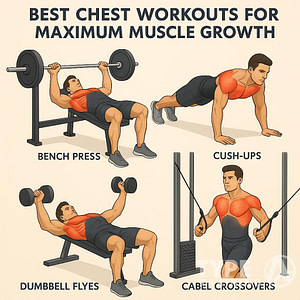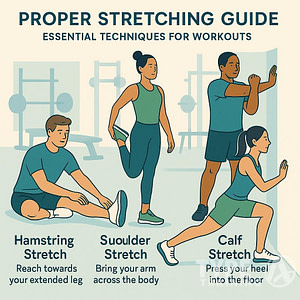Embarking on a fitness journey can be a transformative experience, but finding the right guide for this adventure is crucial. An exceptional personal trainer does more than just supervise workouts; they become the catalyst for achieving your fitness goals.
Whether it’s building muscle, losing weight, or enhancing overall fitness, the importance of a qualified trainer cannot be overstressed. With numerous trainers available, distinguishing between one who will propel you to success and one who might lead you down a path of frustration is key to your progress.
Navigating the world of personal training involves understanding your specific needs, recognizing the signs of a solid professional, and being aware of the potential pitfalls.
Considering factors such as the trainer’s certifications, their training approach, and the financial investment involved will equip you with the confidence to make an informed decision.
Popular posts:
Whether you’re considering in-person sessions or the flexibility of online training, being well-informed is your first step toward a fruitful partnership with a personal trainer.
Evaluating Your Personal Trainer Requirements
When selecting a personal trainer, aligning them with your fitness goals is crucial.
Whether your target is significant weight loss, muscle gain, or preparing for a specific event, your trainer should have expertise in that domain. Not all trainers are versed in every type of training – a marathon enthusiast may not be your ideal choice for powerlifting guidance.
To ensure a fruitful relationship with your trainer, consider the following aspects:
- Identify Your Fitness Objectives: Setting clear targets, such as losing a specific amount of weight, increasing strength, or simply integrating fitness into your life for a healthier you, is the first step.
- Training Specialty of the Trainer: Seek out trainers with a proven track record in the areas you wish to focus on.
- For instance, if building muscle is your aim, a trainer with a background in weightlifting is likely a better match than one who specializes in marathon training.
- Training Frequency and Duration: Decide if you require an intensive, short-term workout regimen or a longer-term consistent routine. This will affect the type of training sessions and the commitment you need from your personal trainer.
- Personal Compatibility: Reflect on what motivates you. Do you thrive with someone offering continuous support, or do you prefer someone who pushes you firmly towards your exercise goals?
Here are some things you might expect from your trainer:
- Custom-Tailored Exercise Programs: Programs that target specific muscle groups and meet your physical needs, including flexibility and cardio.
- Nutritional Guidance: Advice on how to support your workout regimen and fitness goals through diet.
- Accountability and Motivation: Regular sessions to keep you on track and motivated for sustained exercise routines.
- Adaptability: Ability to adjust workout routines as you progress or hit plateaus.
- Tracking Progress: Consistent monitoring of your body measurements and body composition to gauge progress.
It’s worthwhile to spend time finding a trainer who not only has the relevant certification and experience but also one whose training philosophy and personality align with your needs. Your investment in a personal trainer is ultimately an investment in the success of your health and fitness journey.
Identifying a Competent Fitness Coach
When embarking on a fitness journey, selecting a qualified personal trainer is crucial for success. Your potential trainer should:
- Engage in Dialogue: Initiate a comprehensive discussion to understand your specific needs and goals.
- Injury and Exercise History: Inquire about any previous injuries and fitness experience to tailor a safe and effective workout plan.
- Nutritional Guidance: Evaluate your dietary habits, which are essential for holistic well-being and progress.
- Lifestyle Modeling: Demonstrate a health-conscious lifestyle, ensuring they embody the fitness principles they advocate.
- Credential Transparency: Share their professional background, certifications, and client success stories to assure their capability.
- Realistic Goal-Setting: Provide a truthful outlook on the time and commitment required to achieve your desired outcomes.
To streamline your search for a local personal trainer:
- Gym Network: Utilize the community and resources at your gym to get recommendations.
- Social Media and Online Platforms: Platforms like Thumbtack and Bark can connect you with top-rated trainers nearby.
- Freelance Trainers: Explore freelance options as they often offer more personalized services and flexible scheduling.
Recognizing Subpar Personal Trainer Practices
When you’re investing in personal training, you’re not just spending money, but also entrusting your fitness and wellness to an expert. Here are some clear indicators that might suggest your personal trainer might not be up to the mark:
- One-Size-Fits-All Approach: If every session seems indistinguishable from the last, and your workouts don’t consider your personal fitness goals, that’s a red flag. Each individual requires a tailored plan, not a generic routine.
- Overcomplicating Workouts: Complexity doesn’t equate to effectiveness. Beware of trainers who prescribe overly complex exercises for the sake of appearing innovative. Your workouts should progressively align with your goals, not just leave you fatigued without any meaningful progress.
- Questionable Qualifications: Ensure your trainer has more than just a rudimentary certification. Continued education and a commitment to keeping abreast with the latest fitness research are signs of a dedicated professional.
- Dubious Advice: If you hear advice that seems counter to widely accepted fitness principles, such as avoiding full range of motion in squats, or assertions that you can target fat loss in specific body areas, consider this a major warning signal.
- Ignoring Individual Health and Safety: A competent trainer always prioritizes your health. If your trainer overlooks your history, doesn’t adapt exercises based on any pre-existing injuries, or insists on using machines exclusively because they are “safer,” you might not be receiving the best guidance for your unique health requirements.
- Disengagement: Professionalism in personal training means full engagement with your workout. Distractions like phones or lack of attention to your form are not just disrespectful but could also hinder your progress and increase injury risks.
- Lack of Results: While physical transformations do not happen overnight, a noticeable stagnation or lack of progress despite consistent training may indicate ineffective program design.
- Financial Priority over Fitness: If you feel your trainer is more interested in scheduling sessions to ensure a steady paycheck rather than genuinely helping you achieve your fitness goals, it might be time to assess whether you are truly getting the service you deserve.
Earning Trust through Professional Credentials
Image credit: traineressentials.cmo
In the realm of personal training, proof of expertise is vital. You might gravitate towards a trainer with an educational background in fields like exercise science or kinesiology. Knowledge in human anatomy and physiology, as one might learn in such programs, underpins a trainer’s capability. But remember, this formal education doesn’t guarantee practical coaching prowess.
Ascertain that your trainer is not just theoretically knowledgeable but also brings hands-on experience to your sessions.
Now, let’s explore the certifications that help establish a trainer’s proficiency:
- National Strength and Conditioning Association (NSCA)
- Recognized for a focus on strength and conditioning, catering to various athletic and fitness goals.
- American College of Sports Medicine (ACSM)
- Esteemed for a scientific approach to health and fitness, physicians and researchers are often among their ranks.
- National Academy of Sports Medicine (NASM)
- Praised for their comprehensive programs, NASM emphasizes corrective exercise strategies.
- American Council on Exercise (ACE)
- Known for a wide range of certifications that support functional fitness and health coaching.
- National Personal Training Institute (NPTI)
- Unlike brief courses, NPTI provides a thorough educational experience through attendance at a dedicated institution.
- CrossFit Certification
- Although achievable in a weekend, judge CrossFit coaches by their ability to guide effectively, not the duration of their certification process.
While these certifications can establish a baseline of competence, they shouldn’t overshadow other qualifications. Certifications grant an initial assurance. However, your decision should weigh in a trainer’s real-world effectiveness and dedication to your objectives.
For example, if you’re eager to excel in Olympic lifting, seek out a trainer with a record of either competing or coaching competitors. Or, if your aim is substantial weight loss, inquire about testimonials from individuals with similar challenges and achievements.
Personal training is an investment not only in your current fitness but also in your trainer’s years of honing their craft. The price reflects their commitment to learning, training, and guiding others to success. True value comes from the wealth of experience that complements the certification hanging on the wall.
Thus, looking beyond the paper proof and considering the application of their skills is essential in selecting a trainer who can most effectively propel you toward your fitness goals.
Pricing of Personal Training Services
image credit: ptdistinction.com
When assessing the value of personal trainers, the prices can fluctuate considerably based on several influencing factors. These factors include your location, the volume and length of sessions, as well as the type of training you’re seeking.
A typical personal trainer might charge around $55 for a one-hour session, but this rate can vary significantly.
The frequency of training intensifies the budget considerations. At a standard gym in a costly urban area, monthly costs could look like:
- 4 sessions: $380
- 8 sessions: $680
- 12 sessions: $948
Comparatively, each session is more economical when purchased in bulk.
Various gym chains also offer personal training services, each with its pricing tier. For instance:
- Standard Gyms: Prices can range from $35 at Anytime Fitness to around $60 at LA Fitness and roughly $80 at 24-Hour Fitness per session.
- Exclusive Gyms: High-end options like Equinox can exceed $110 per hour.
Convenience matters, so for those preferring to stay home, in-home personal training averages at about $65 an hour, though this can vary broadly.
While it’s tempting to equate higher cost with superior quality, this isn’t always the case.
Remember, an excellent match for you depends on your specific fitness goals, desired support level, and personal compatibility with the trainer.
A $30 session might be underwhelming if the trainer’s expertise is insufficient, whereas $100 could be an excellent investment for a trainer who tailors their approach to your needs, providing motivation and consistent results.
Choosing a personal trainer is more than paying for their time; it represents an investment in their accumulated knowledge, credentials, and commitment to your fitness journey.
What you are really gaining is the assurance you are exercising right, a push towards continued progress, and, with dedication, outcomes that meet or exceed your expectations.
Personal trainers are not limited to on-site interactions. Online training programs often provide cost-effective solutions with a broader scope of support, including detailed workout guidance, nutritional advice, and assistance with setting realistic goals.
Remember, workouts constitute just a fraction of your week. The true transformation occurs in daily life, and a quality trainer will support you beyond the gym, helping foster the habits that lead to lasting change.
Related: How Much Does Personal Training Cost in Manhattan? A Comprehensive Guide
Exploring Online Personal Training: Advantages and Considerations
When considering an online personal trainer, you’re looking at both distinct advantages and possible drawbacks.
Understanding these can help inform your decision on whether this form of fitness coaching is suitable for you.
Advantages of an Online Personal Trainer
- Scheduling Flexibility: Work out at your convenience, since your trainer provides you with a program in advance to complete on your timetable.
- Uninterrupted Accountability: No matter where life takes you, your trainer can design workouts to accommodate your changing situation, ensuring continuous support.
- Nutritional Guidance Beyond the Gym: Online trainers can offer more than exercise routines; they can also be a resource for healthier eating habits and lifestyle changes.
- Cost Effectiveness: Without the need for a physical presence during workouts, online trainers offer more affordable rates compared to traditional in-person sessions.
- Accessibility: With the closure of physical gyms or limited access, online training may be your most viable or even only option for maintaining fitness.
Considerations for an Online Personal Trainer
- Self-Motivation Is Key: With online training, the onus is on you to complete workouts and be truthful with your coach. The discipline to follow through rests in your hands.
- Lack of Immediate Physical Feedback: Unlike in-person trainers who can spot and correct your form on the spot, online training relies on video assessments, which may not provide instant critiques.
- Inherent Motivation of Monetary Investment: Committing to a session with an in-person trainer might be more motivating simply because you risk losing your investment if you skip a session, offering a different level of immediacy and accountability.
Related: Type A Training Offers Online Personal Training
Tips for Selecting the Right Fitness Coach
When you decide to bring a fitness coach into your life, it’s crucial to grant them time to understand your goals and needs.
Think of your initial sessions as foundational. A quality trainer will assess your abilities to tailor a plan that will evolve over time.
Results won’t appear overnight, so be patient and allow at least five sessions to evaluate the effectiveness of the partnership.
1. Investment in a Trainer: A Reflection of Your Commitment
Embarking on a fitness journey with a personal trainer is an investment not just financially but also in terms of time and effort.
Remember, obtaining a trainer is not a substitute for hard work. Your progress depends on your dedication in and out of the gym.
Treat your trainer as a motivator and guide who provides direction and expertise, not as a scapegoat for lack of progress.
2. Constructive Interaction: The Key to Progress
Feedback and Finesse: When faced with recommendations from your trainer, instead of outright rejection, initiate a constructive conversation.
Propose alternatives and express preferences – cooperation is the nucleus of a successful client-trainer relationship.
The focus should always be on finding feasible solutions that align with your lifestyle.
3. The Dynamic of Enjoyment and Results
Should you find the rapport with your trainer enjoyable and productive, share your pleasure and maintain the collaboration.
Be transparent about your developments; this allows your trainer to adapt your program effectively.
Conversely, if the rapport is lacking, it is perfectly acceptable to conclude your sessions.
A professional trainer will inquire about improvements they could make, rather than pressuring you to stay.
4. Lifelong Fitness and Finding the Right Guide
Embark on your fitness quest with realistic expectations. A good trainer provides guidance, but without your commitment to the work, the magic won’t happen.
Remember, persistence is key to finding a great fitness ally.
It’s not just about a workout buddy but someone who is invested in your lifelong health journey.
Common Questions Regarding Personal Trainer Hiring
5. Criteria for Selecting a Qualified Personal Trainer
When looking for a personal trainer, ensure they hold credible certifications from recognized organizations, such as NASM or
Additionally, verify if they have a relevant degree in exercise science or a related field.
Look for someone with experience and a track record of success with previous clients whose goals were similar to yours.
6. Evaluating a Personal Trainer’s Effectiveness
To gauge a personal trainer’s potential effectiveness:
- Request testimonials or references from past clients.
- Observe a training session if possible.
- Inquire about their approach to measuring progress.
7. Average Investment in Personal Training
Personal training costs vary widely depending on location, trainer’s experience, and session length.
Prices can range from $30 to $100 per hour. Research local rates, and consider if the trainer’s expertise aligns with the price they are charging.
8. Matching a Trainer to Your Fitness Objectives
Discussing your specific fitness objectives with potential trainers is crucial:
- Ensure they have experience in the areas you’re aiming to improve.
- Ask how they’ve helped others achieve similar goals.
9. Comparing In-Person and Virtual Personal Training
- Hands-on guidance
- Direct feedback
In-Person Cons:
- Higher cost
- Schedule inflexibility
Virtual Pros:
- More convenience
- Often more affordable
Virtual Cons:
- Less personalized interaction
- Requires self-motivation
10. Frequency of Sessions for Desired Outcomes
The ideal frequency of personal training sessions depends on several factors. These include your goals, schedule, and budget.
As a starting point, meeting with a personal trainer 1-2 times per week can offer noticeable improvements while allowing time for independent workouts.












